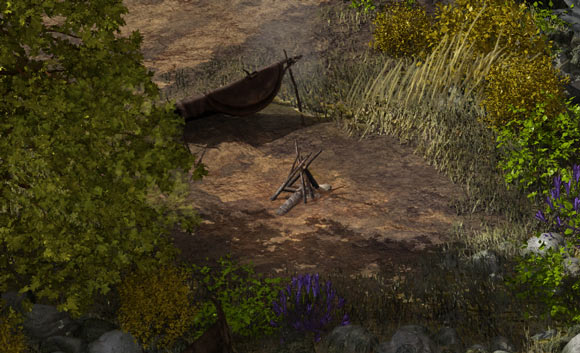Most of what I dislike in the IE games has to do with specific elements of content or rules, not the games overall. This probably won't be surprising to anyone, but I even think my three favorite RPGs of all time (Fallout, Darklands, Pool of Radiance) have a ton of problems and I would want to significantly revise aspects of their mechanics or interface if I were handling a game made in their respective spirits.
What I like about the IE games (not content-specific):
* Allow for a lot of large, beautiful areas that promote and reward exploration. There's plenty of 3D art that I like, but I love using 2D art when we can because we can make some amazing environments. Laying those areas out and thinking about how the player will move through the environment to uncover rooms, encounters, etc. is a lot of fun as a designer. As a player, it's always fun. The feeling is not the same in first-person or close first-person game, and it's also not quite the same in 3D. We didn't always use this well (e.g. some areas in IWD and HoW were very linear) and I think those areas suffered because of it.
* Responsiveness. I've always felt that the IE was very responsive to player input and AI state changes. Selection, movement, and execution of commands were all very "crisp" in the IE games, probably owing to its roots as Battleground Infinity (an RTS). Other than pathfinding, controlling characters felt good in the IE (IMO, anyway) -- better than it does in a lot of other RPGs.
* Tactical combat. I disliked some of the specific rules or rule implementations, but I always enjoyed the tactical combat in the BG and IWD games. I loved designing it and I loved playing it. In particular, "symmetrical" battles with parties or other class/level characters were a lot of fun. I like the more scripted feeling of those fights even if I didn't like the rock/paper/scissors nature of some of the hard counters. I enjoy turn-based combat a lot, but I had already been introduced to RTwP 6 years before BG, so I also enjoyed/had no problem with BG's fundamental style of RPG combat.
* General party control. You can access and arrange (almost) everything about your characters, shift them around relative to each other, use formations (though I like ToEE's better), advance and equip everyone individually, etc. Even when I didn't always like all of the companions' personalities, I liked that they *had* personalities and would interact with you/each other. And in the IWD games, we liked that we could make all of our own characters.
* The huge variety of characters/parties you could make. Overall, just lots of options that created great variability in strategic and tactical options -- and different role-playing opportunities.
For content-specific things:
* I loved the scope and variety of areas in all of the IE games, but especially BG1 and BG2. As a former BIS guy, I'm always going to prefer the *style* of areas we developed for IWD (and, just before my time, for PST), but the BG games had a ton of huge areas to explore and an enormous amount of content. I still think BG2's early-game content could have been paced better. Even though BG had a lot of dead space, I still loved exploring the Sword Coast.
* The tactical combat in BG2, IWD, and IWD2. My main complaint with BG2 combat is the hard-counter wizard fights. I don't think hard-counters belong in a game where you can easily, unintentionally, build a party that lacks the hard-counter. I also don't think save or die effects belong in a game with save/reload, but that's a larger issue with 2nd and some elements of 3rd Edition A/D&D. Notably, it's mostly absent from 4E and I think that aspect of the game is better for it.
* How PST handled dialogue from the perspective of making it more than literally just saying words to another character. PST's dialogue allowed you to do much more in conversations and helped the player feel like they were *doing* things. Of course, PST's level of player agency in the story and with companions is fantastic.
* The overall volume and varied responses/plotlines of companions in BG2 and PST.
* The music of all of the games. They were all great.
* The style of interfaces. They' were weighty and solid and the sound effects that accompanied them made them feel even weightier. Do I prefer the "across the bottom" UIs of IWD2 and PST to the wrap-arounds of BG and BG2? Yep. There you go.
I think that covers most of it. I worked on four of the IE titles (IWD, HoW, TotL, IWD2). I hope people understand that I didn't come out of that experience thinking that either the engine or games were anything close to flawless. I watched dozens and eventually hundreds of designers and players interact with these games for years. When I'm critical of them, it's because I think they can be even better, not because I don't think they were good in the first place.































![The Year of Incline [2014] Codex 2014](/forums/smiles/campaign_tags/campaign_incline2014.png)


